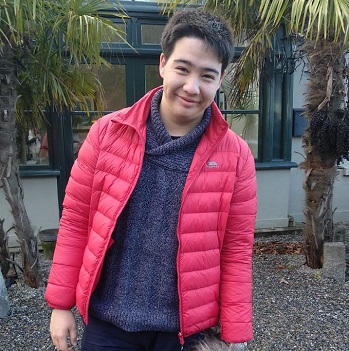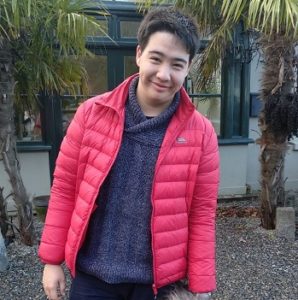
Hi, I’m Wesley, I’m a third-year medical student, and I’ve just finished my intercalation in Anatomy and Development. Whilst most UK medical schools offer intercalation, a few like Edinburgh make it a compulsory component of the course.
So many options
Looking back, intercalation was a really great opportunity to try new things and be a ‘non-medic’. It allowed us to pick between ~20 wide-ranging degrees, and actually choose elective modules for once.
I chose BMedSci (Hons) Anatomy and Development along with the Anatomy of the Head and Neck and Inflammation and Tissue Repair electives. The two electives were quite different, but both provided useful experience and the timetabling combination meant I had Monday and Tuesday free for first semester, allowing me to incorporate other activities into the week. In comparison, second semester is a lot more busy, almost like a 9 to 5 job in the lab for 12 weeks.
Unique opportunities
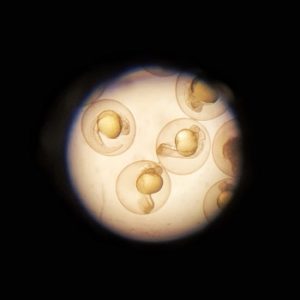
The Head and Neck elective was a special opportunity, as it allowed us to perform dissections on cadavers as part of our studies. It was a real privilege and having done so I can say that seeing anatomy and being able to learn from the cadavers is extremely informative and a once-in-a-lifetime experience. Prosections, textbooks, models and anatomage tables just don’t compare!
The Inflammation and Tissue Repair course was a bit different, with a very scientific and research-based approach that gave us access to world-class researchers that really knew about their fields to share the insights that recent research had revealed.
Time to explore
Intercalation is not just about studying and gaining an extra degree. The flexible schedule in semester one also allows for more interaction with student societies and of course catching up with friends over brunch or coffee. It was a great chance to explore what Edinburgh has to offer: picnics in the Meadows, café-hopping in Stockbridge, brunch on the Portobello esplanade and sunset hikes up Arthur’s Seat. There’s always stuff going on, like the mass ceilidh I once stumbled on in the Royal Mile while showing my family around.
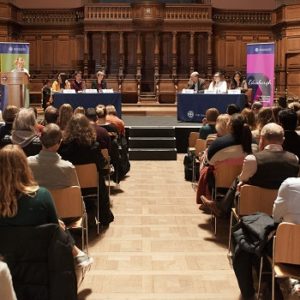
For many, including myself, intercalation has a different style of learning which is a great reminder of why studying medicine is so compelling and why I originally chose it. There is definitely an increased focus on independent work and self-driven research.
An exciting year
Intercalation was also exciting as it gave me a chance to get involved in other events the medical school was running. I was fortunate to be able to get involved in the 2019 Edinburgh Medical School Debate on patriarchy in medicine which was a really exciting and eye-opening experience. I also had some fun being an extra in BBC TV shows in the first semester.
Research project
One of the hardest things in intercalation is finding and settling on a dissertation project. There are literally hundreds of choices, in different fields and even locations from Little France, to George Square, to the Western General and even Roslin! The projects vary in popularity, but most supervisors will take the time to talk to you face-to-face and discuss the project during the decision making process.
Picking both an interesting topic and a good supervisor is an important balance; without the careful and helpful supervision I got, I don’t think I would have been able to do everything I did in the time I got in the lab. And if lab work doesn’t interest you there’s other types of dissertation, like literature reviews, clinical projects, data analysis and group lab projects. If none of the offered projects suit you, you can always approach a researcher to make your own.
Intercalation during coronavirus
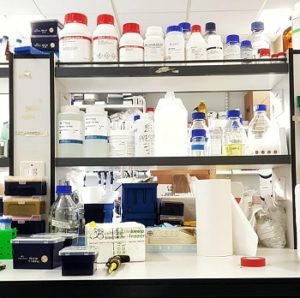
Coronavirus unfortunately brought a premature end to my 12 week research project, cutting it down to seven weeks. However, I’m very thankful to the lab team and my supervisors, who were extremely supportive and helpful throughout the process. Whilst the Covid-19 pandemic has brought a lot of change, it hasn’t changed the value of all of the things my intercalation has taught me.
Currently, I’m helping with testing in Singapore for COVID-19. The anatomical knowledge I learnt in semester one continues to be useful as I perform the nasopharyngeal swabs; they go surprisingly deep (from the nose to around the tragus of the ear), as I discovered when we practised on each other.

